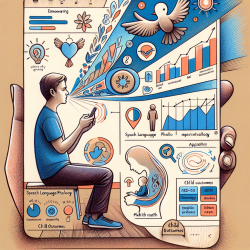Introduction
In the realm of speech-language pathology, data-driven decisions are pivotal in crafting effective interventions. The recent study titled "My Health Coach: Community members’ perspectives on a mobile health tool for adults with fetal alcohol spectrum disorders" provides a compelling exploration into the potential of mobile health (mHealth) applications to support adults with Fetal Alcohol Spectrum Disorders (FASD). This blog post will delve into the findings of this study and how practitioners can utilize these insights to enhance their practice and improve outcomes for children and adults with FASD.
Understanding FASD and Its Challenges
Fetal Alcohol Spectrum Disorders are lifelong conditions resulting from prenatal alcohol exposure, affecting multiple domains of functioning. Despite their prevalence, many individuals with FASD remain undiagnosed, and adults often face significant barriers in accessing appropriate care. This gap in services underscores the need for innovative solutions, such as the My Health Coach app, which aims to empower adults with FASD through self-management and health advocacy tools.
The My Health Coach App: A Community-Engaged Approach
The My Health Coach app was developed through a partnership between researchers at the University of Rochester and the International Adult Leadership Collaborative (ALC) of FASD Changemakers. This collaboration ensured that the app was designed with direct input from adults with FASD, aligning with the principle of "Nothing About Us Without Us." The app is informed by self-determination theory (SDT), focusing on autonomy, competence, and relatedness to enhance users' well-being.
Key Features and Practitioner Implications
- Customization and Personalization: The app allows users to customize their health coach and avatar, promoting a sense of ownership and engagement. Practitioners can encourage clients to personalize their app experience to enhance motivation and adherence.
- Daily Check-Ins: Through chatbot interactions, users can engage in daily check-ins that track mood, health symptoms, and more. This feature can aid practitioners in monitoring client progress and tailoring interventions accordingly.
- Self-Advocacy Tools: The app provides resources to help users advocate for themselves in healthcare settings. Practitioners can support clients in utilizing these tools to improve communication with healthcare providers.
Encouraging Further Research
The positive reception of the My Health Coach app highlights the potential of mHealth solutions in addressing the needs of adults with FASD. However, further research is essential to evaluate the app's long-term efficacy and explore additional features that could enhance its utility. Practitioners are encouraged to engage in research efforts that investigate the broader applications of mHealth technologies in supporting individuals with developmental disabilities.
Conclusion
The My Health Coach app represents a significant step forward in leveraging technology to support adults with FASD. By incorporating community feedback and focusing on self-determination, the app offers a promising tool for enhancing self-management and health advocacy. Practitioners can play a crucial role in integrating such technologies into their practice, ultimately improving outcomes for individuals with FASD.
To read the original research paper, please follow this link: My Health Coach: Community members’ perspectives on a mobile health tool for adults with fetal alcohol spectrum disorders.










